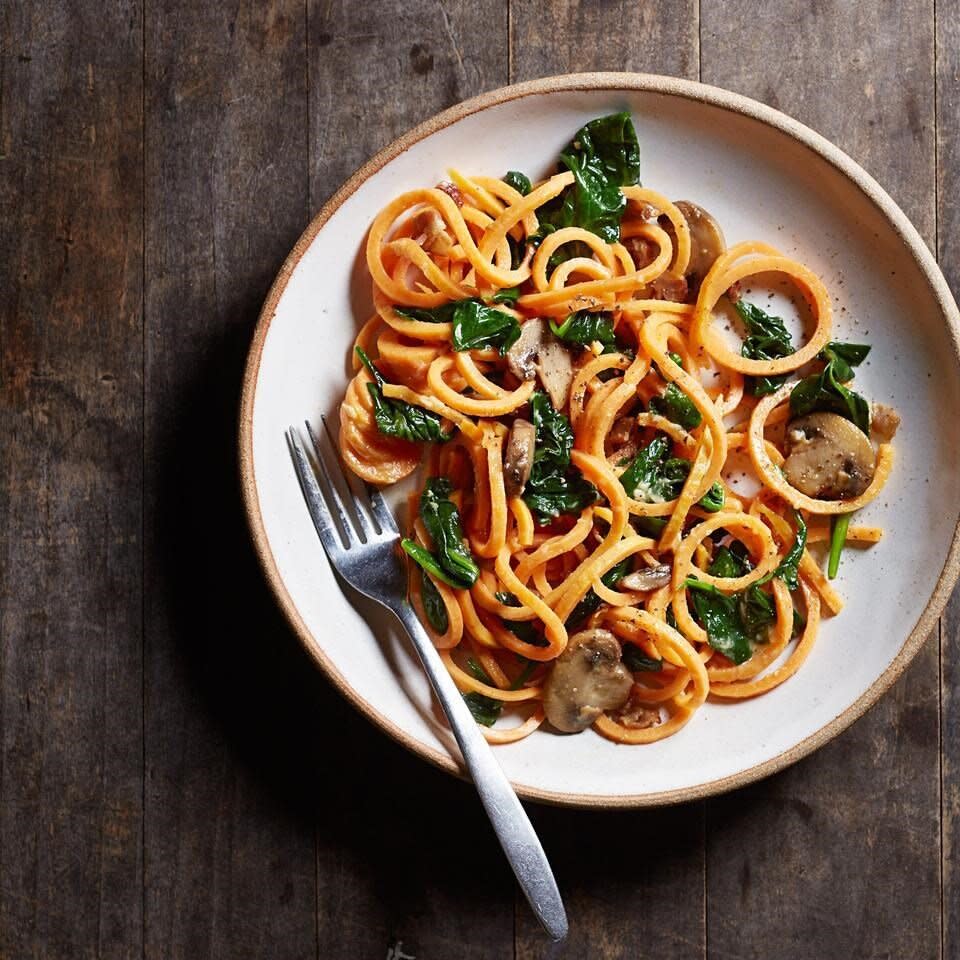What Is a Complex Carbohydrate?

Recipe to Try: Creamy Fettuccine with Brussels Sprouts & Mushrooms
When you hear "carbohydrates," you may envision white bread, rice and pasta and think these are foods to limit or avoid. But have you heard about complex carbohydrates and how they can be part of a healthy diet? Read on to find out what complex carbohydrates are.
What are Carbohydrates?
Everyone needs carbohydrates—they're your body's preferred source of energy. Digested faster than protein and fat, they give your brain and muscles needed fuel so you can think and move. How many carbohydrates you need in a day depends on your individual needs. The 2020-2025 Dietary Guidelines recommend carbohydrates make up 45 to 65% of your daily calories. For example, if you eat 2,000 calories a day, about 900 to 1,300 calories should come from eating carbohydrates. This translates to about 225 to 325 grams of carbohydrates per day, and most of those carbs should come from healthy complex carbohydrate sources.
Related: What Does a Healthy Serving of Carbs Look Like?
What's the Difference Between Simple and Complex Carbohydrates?
Simple carbohydrates (aka simple sugars) are broken down quickly by your body—they have just one or two sugar molecules linked together. Honey (fructose and glucose), table sugar (sucrose) and milk (lactose) all contain simple carbohydrates.
Complex carbohydrates have more nutrients and take longer for your body to digest, so they help fill you up and don't cause the same swings in blood sugars as simple carbs. "Complex carbohydrates are larger molecules than simple carbohydrates," says Molly Cleary, M.S., RD, a registered dietitian in New York City. "This means it takes our body longer to digest and absorb them."
Grains, beans, fruits and vegetables (yes, even potatoes) all contain complex carbohydrates. Many carb foods have a mix of carbohydrates; for example, fruit contains natural fruit sugar (fructose, a simple carb) as well as dietary fiber (also a type of carb). The most healthful carbohydrates include unrefined plant foods that are low to no added sugars and high in fiber—they are what we tend to call "complex carbohydrates" and what we could all use more of in our diet.

Recipe to Try: Apple-Cinnamon Quinoa Bowl
Why Are Complex Carbs Better than Simple Ones?

Recipe to Try: Sweet Potato Carbonara with Spinach & Mushrooms
There are several reasons for including complex carbs in your diet:
Keep You Full Longer and Stabilize Blood Sugar Levels
Foods mostly made up of simple carbohydrates—candy, pastries and soda- provide an instant energy source. As such, they are digested quickly and spike your blood sugar, leading to the post-sugar crash you may be familiar with and feeling hungry again soon after. Complex carbohydrates take longer to break down since their molecular structure is larger. The best ones also have plenty of fiber, which moves slowly through the digestive tract. "Complex carbs digest more slowly and help us to feel more satiated and fuller for longer—so it can help with portion and eating control," says Isabel Smith, M.S., RD, CDN, registered dietitian and founder of Isabel Smith Nutrition, Inc.

Recipe to Try: Black Bean-Quinoa Buddha Bowl
Have More Nutrients
"In addition [to regulating blood sugar], complex carbohydrates often also contain fiber, vitamins, minerals and antioxidants that simple carbohydrates do not," says Cleary. For example, a sweet potato is chock-full of vitamin A, fiber and antioxidants, whereas simple carbohydrates provide sugar without healthful nutrients.
Are Good for Your Heart and Might Help You Lose Weight
Foods rich in soluble fiber—the kind found in complex carbohydrates like apples and oatmeal—can help lower your LDL or "bad" cholesterol. The average American only eats about 15 grams of fiber per day, so eating 25 to 35 grams of fiber per day may help lose weight and keep it off long-term.
Ways to Eat More Complex Carbohydrates
Complex carbohydrates can be a healthy part of every meal and snack. Pair them with protein and healthy fats for extra energy and satiety. Here are easy ways to incorporate them.
Don't Be Afraid of Potatoes
One medium potato (170 grams) boasts a whopping 2 grams of fiber, 3 grams of protein and 18 percent of your daily value of potassium. If you have potatoes at dinner, fill the rest of your plate with nonstarchy vegetables, like broccoli or Brussels sprouts, and protein.
Choose Whole Grains over Refined Grains
Whole grains like quinoa, farro, amaranth, barley, soba noodles, whole-wheat pasta and brown rice are complex carbohydrates that not only fill you up with fiber but also deliver extra vitamins and minerals you won't usually get from refined grain products like white rice or white pasta.
Add More Plants to Your Plate
"You can't underestimate the importance of eating more plants, and if you're looking for complex carbs then vegetables...beans [and] legumes are an obvious choice," says Allison Knott, M.S., RDN, a registered dietitian based in Brooklyn, New York. "Consider adding spiralized root vegetables like sweet potatoes or parsnips to pasta dishes, swap meat for beans in chili and burgers (or go half-and-half), or add cooked leafy greens to soups, egg scrambles, pastas and sandwiches," she suggests.
Simplify Your Snack with Complex Carbs
Your snacks can be simple to make but full of complex carbohydrates. A sliced apple or banana topped with peanut butter delivers healthy good-for-you carbs. Or think outside the box and grab beans. "Snack on high-fiber options such as roasted chickpeas or roasted broad beans," says Knott.
The Bottom line
Including complex carbs more often in your diet offers several health benefits, from stabilizing your blood sugar to keeping your digestive health in check. Now that you have gotten a lowdown on the differences between simple and complex carbs, browse our collection of Healthy Grain Recipes, Healthy Vegetable Recipes and 15-Minute Plant-Based Dinner Plan for the Week to see how you can include complex carbs as part of your meals today!